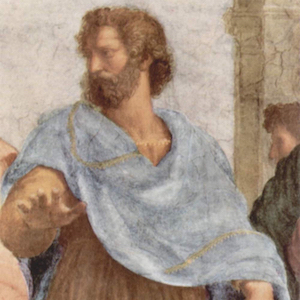Aristotle

This course is a close study of one of the most preeminent philosophers, Aristotle. We will try to understand Aristotle’s sometimes puzzling writings, consider his substantial philosophical views, as well as the reasons he gave for endorsing those views.
Earlier Semesters
2019 Autumn syllabus; course site
Class Schedule, 2025 Spring
All the page numbers refer to those in J. L. Ackrill (ed.), A New Aristotle Reader, Princeton University Press, 1989 (ISBN: 0-691-02043-3).
Week 1: Introduction; Why philosophy?
- Protrepticus
- (optional: Hutchinson & Johnson, “Authenticating the Protrepticus”)
-
(optional: Frede, “The Study of Ancient Philosophy”)
- Guiding questions: Why do we study philosophy? Can you give an argument for why you chose to study philosophy?
Week 2: Natural science
- Phys. II (93–110); Meta. V.4 (270–71), VI.1 (278–80)
-
(optional: Ferejohn, “Empiricism and the First Principles”)
- Guiding questions: What are the basic concepts of natural science, for Aristotle? What kinds of things does physics deal with?
Week 3: Scientific explanation and scientific knowledge
- Anal. post. I–II (39–59)
-
(optional: Burnyeat, “Aristotle on Understanding Knowledge”)
- Guiding questions: Why does Aristotle think that we need indemonstrable first principles in every science? What are these principles and how do we know them? How do we acquire scientific knowledge, for Aristotle?
Week 4: Ontology
- Cat. (5–11); Meta. VII.1–9 (284–98)
-
(optional: Frede, “Substance in Aristotle’s Metaphysics”)
- Guiding questions: What are the basic kinds of entities for Aristotle? Are the accounts in the Categories and in the Metaphysics express the same thoughts? If so, how, or if not, why?
Week 5: The unmoved mover
- Meta. XII (339–55)
-
(optional: Bordt, “Why Aristotle’s God is Not the Unmoved Mover”)
- Guiding questions: What does Aristotle’s Unmoved Mover explain in the world? What can we know about the Unmoved Mover?
Reading week (no class)
Week 6: Application: the soul and perception
- De an. II.1–7 (165–77)
-
(optional: Ackrill, “Aristotle’s Definitions of Psuche”)
- Guiding questions: How does Aristotle apply the established metaphysical framework to living things? What is the most general operation of living things, and of animals, in particular?
Week 7: Thinking
- De an. III.3–8 (191–200)
-
(optional: Cohoe, “Nous in Aristotle’s De anima”)
- Guiding questions: How does thinking work, for Aristotle? What do we know about the intellect?
Week 8: Living well and the virtues
- EN I.1–3, 7–8, 13; II.1–2, 5–9 (363–387, sel.)
-
(optional: Lawrence, “Human Good and Human Function”)
- Guiding questions: What is the good without qualification, for Aristotle? How can one achieve it? Why do we need virtues?
Week 9: Friendship
- EN IX (452–59)
-
(optional: Biss, “Aristotle on Friendship”)
- Guiding questions: What distinguishes and characterises the different kinds of friendships, for Aristotle? Does the wise person need friends? Why or why not?
Week 10: The contemplative life
- EN X.6–9 (468–78)
-
(optional: Liu, “An All-inclusive Interpretation of Aristotle’s Contemplative Life”)
- Guiding questions: Why does Aristotle think that the contemplative life is the best form of life for a human being? What is contemplation, exactly?
Other things
Fragments from Aristotle’s Protrepticus
Background: Parmenides and Plato
Diogenes Laertius on Aristotle
Why care about reading dead people anyway?
Bibliography
There is an immense amount of literature both on Aristotle in general and on practically every one of his major ideas. These books are only meant to give you a start; the best thing to do is to check out their bibliography and see if you find anything that looks relevant to your topic. As always, the SEP is also a good resource.
A couple of general sources on Ancient Philosophy
William Guthrie. A History of Greek Philosophy. Cambridge: Cambridge University Press, 1962–81. 6 vols., from the Presocratics to Aristotle.
Terence Irwin. Classical Thought. Oxford: Oxford University Press, 1989.
Christopher Shields. Ancient Philosophy: A Contemporary Introduction. London: Routledge, 2012. A general introduction to Ancient Greek philosophy, focusing on arguments. It also contains a very good bibliography.
Aristotle in particular
Christopher Shields. Aristotle. London: Routledge, 2014. Highly recommended introduction with excellent introductory bibliography.
Sir David Ross. Aristotle. Oxford: Oxford University Press, 1984. Old (1923) but still very useful.
J. Ackrill. Aristotle the Philosopher. Oxford: Oxford University Press, 1981.
Jonathan Barnes. Aristotle: A Very Short Introduction. Oxford: Oxford University Press, 1982.
Jonathan Lear. Aristotle: The Desire to Understand. Cambridge: Cambridge University Press, 1988. Not quite comprehensive but very engaging.
Christopher Shields, ed. The Oxford Handbook of Aristotle. Oxford: Oxford University Press, 2012.
Jonathan Barnes, ed. The Cambridge Companion to Aristotle. Cambridge: Cambridge University Press, 1995.
G. Anagnostopoulos, ed. A Companion to Aristotle. Blackwell, 2009.